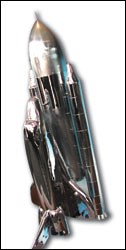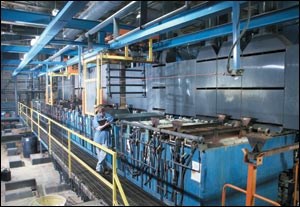Finishing First in Quality
As it celebrates its 50th anniversary, Lincoln Plating continues to grow, improve and prosper in all areas of business…
This year, 2002, Lincoln Plating Company (Lincoln, NE) has many reasons to celebrate. Its major reason is its 50th anniversary. Another reason is that the company is having another spectacular year in spite of the weak economy. And still another is that it is a dynamic company constantly striving to improve.
Everyone in the company attributes Lincoln's success to it beliefs and drivers. "These are the stability of the company," stated Hank Orme, president. "We believe our people and their unique talents should be valued. Therefore, we have set up programs whereby we can recognize their success." Lincoln Plating believes that recognizing its employees' achievements through service awards, productivity sharing programs and other recognition programs motivates them toward success and continuous improvement. This, in turn, ensures profitability and the survival of the company.
Lincoln also believes that positive relationships build loyalty, and that honesty is essential in all transactions. Establishing good relationships with customers fosters a desire to create something of greater value for them, not simply a finished product. The belief in quality is what drives employees to create value for the customer.
Driving quality is the idea that productivity improvement is a continuous process. Quality includes on-time delivery and superior service because customers depend on it. But the company will never sacrifice a safe-working environment, because it is committed to its people. Lincoln values its people and their development because they, ultimately, drive the company's success. And finally, but also important, is its drive for environmental responsibility, which is its commitment to the community.
So, all this is very well and good, but how does Lincoln Plating ensure that these beliefs and drivers are kept alive within the company? "Some companies may have their beliefs and drivers posted on the wall," noted Mr. Orme, "Lincoln Plating takes it very seriously, and we measure how people in this organization feel we are performing."
Twice a year Lincoln anonymously surveys its employees about senior management. "This lets us know how employees feel about us as supervisors and managers," explained Mr. Orme. Senior management reviews the results and decides what improvements are needed and puts together a program for improvement based on what the employees have "said" in the survey.
The company also runs a departmental survey in which each department rates the other departments as internal customers. If any issues arise between departments, actions are taken to rectify the situation before it becomes a problem.
The third survey is a critical customer survey conducted yearly by the Gallup Organization, which is headquartered in Lincoln, NE. The survey is administered to approximately 75 of Lincoln's strategic customers and concentrates on four or five key areas. The answers are provided in a rating form of 1-5. Lincoln strives to keep its rating at 4 or above. "Our goal is to have no surprises here," noted Jim Dutmer, customer relations manager. "We meet with our customers on a monthly or quarterly basis and any one of them can pick up the phone at any time and call us. If we are in contact with someone that often and receive a bad rating, something has gone seriously wrong. We need to find out about it immediately and make it right. Fortunately, this hasn't happened."
The Gallup survey is sent out to both Tier I and Tier II customers. "Tier I customers are those where we buy the product and supply it complete to the customer," explained Mr. Dutmer. "For Tier II customers, we receive the product from somewhere else and just perform the services, whether it is plating, polishing or some assembly, and then supply it back to the customers. Not as much supply-chain management is involved."
Most of what Lincoln Plating does involves Tier I customers. To develop its business with Tier I suppliers, the senior management of Lincoln Plating developed a strategy, Integrated Finishing Services. "We spend a lot of time on strategy," said Mr. Orme. "We meet formally offsite about three times a year for strategy sessions. I also meet with the operating team every Monday morning to review how we are doing against our objectives and what's going on in the business."
Integrated Finishing Services (IFS) is a wholly owned entity of Lincoln Plating Company that allows it to participate in all parts of the supply chain. IFS manages customers' finishing needs with services that directly impact part quality, delivery and cost. IFS's expertise is finishing first and integration second. Lincoln Plating believes that its expertise in finishing gives it a competitive advantage, allowing it to impact its customers' supply chain in a way that has the most benefit to the customers and their suppliers.
IFS works with customers with large finishing needs, regardless if they have one or multiple finishing suppliers. In addition, to managing the finishing supply chain, IFS can work with product and process design, process improvement and even warranty management. IFS's success has been tied to Lincoln Plating's history of successfully managing large, technically challenging projects, often involving supply chain management.
However, Lincoln plating did not start as a company that looked for the large, challenging projects. Fifty years ago, Marc LeBaron's father, Dale, purchased the one-man company and started plating custom work for people in and near Lincoln. For many years the business remained stable, however, in the late 1960s it started to grow, and in the 1970s the company began its transition to mostly commercial work. Marc purchased the company from his father in mid-1980s. Since then, Marc has steered the company into strictly commercial work.
"During the past 15 years of the company, about one-third of our business was corrosion coatings, which would be zinc and cadmium and those types of coatings. Another third would be engineering coatings such as electroless nickel. The last third would be decorative such as nickel/chrome or bright dip anodizing," explained Mr. LeBaron. "That has changed in the last 2-3 years because demand from the agricultural sector has dropped. Most of the corrosion finishes we did were for the agricultural sector. Even though that business is down, we have seen our decorative business really explode."
The company projects that it will be out of nickel/chrome capacity by December 2002. Therefore, it has started construction on its largest expansion in company history. The expansion will add a total of 80,000 ft2 to the existing facility. Phase I will add a 28,500-ft2 facility, which will include 18,250 ft2 of production space and 10,250 ft2 for utilities. The new production area will feature two automated nickel/chrome plating lines. There will also be space for boilers, air compressors and electrical switchgear.
In addition to new plating lines, the new facility will provide space for some of Lincoln's customers. One of Lincoln's customers already leases space at the Lincoln facility. The company produces mufflers, which, after production, are then moved into a transfer area and stationed for finishing. The new building will have several accesses to this transfer area, where parts can be staged for various finishing processes. Companies that lease the property for manufacturing can cut down on freight costs, but more importantly, develop a better working relationship with Lincoln Plating. These companies will have the opportunity to become part of the team created to engineer and integrate each job.
The mix of processes offered at Lincoln Plating has helped keep it operating and profitable. Nearly 50 processes are available, including standard and hard anodizing, black oxiding, cadmium, chromate conversion coatings, copper, electroless nickel and electroless nickel composites, electropolishing, gold, hard chromium, magnesium, nickel, passivation, phosphate coatings, polishing, silver, tin, vibratory finishing and zinc.
But Lincoln is not focused simply on its plating services. "Not only are we focused on larger, more challenging projects," stated Mr. LeBaron, "we want to be the one customer for these projects." For example, Lincoln Plating would go in and manage tooling, stamping for the tooling and design changes for the tooling, all so that plating costs could be reduced. Or in some cases it is managing the plating process. "There have not been many changes in plating processes, maybe some changes in proprietary baths, but most baths are pretty much the same as they were 25 years ago," stated Mr. LeBaron. "How you control them and what you can do with those processes today that you couldn't do 25 years ago is what's different."
An example of that is a corrosion resistant sulfamate nickel and hard chrome finish Lincoln is applying on hydraulic cylinders. This particular job has a strict specification as far as porosity. "On many hydraulic cylinders, porosity wouldn't make a major difference," explained Mr. LeBaron, "but it does on this particular cylinder. It is a job that fits us quite well because we have the engineering staff to handle it. We were able to develop a process that goes way beyond what commercial hard chrome can do."
A new high capacity line was developed to handle this new process. The line can turn over thousands of parts per week. The process has improved throwing power of the plating bath resulting in high deposition rates. This combines with the functionality of hard chrome resulting in a highly durable and corrosion resistant finish. Salt spray results show the sulfamate nickel/hard chrome finish withstands more than 100 hr. This is just one of the engineering/finishing challenges that Lincoln Plating has successfully handled.
As stated, the beliefs and drivers are the foundation of the company: continuous improvement, innovation, on-time delivery, environmental responsibility, safe working environment, productivity improvement, etc. To measure these on the plating lines, Lincoln uses certain metrics: Safety, Quality, Performance, Environment and Sales. Charts indicating each line's progress are large and visible to everyone in the company. Some groups even get involved in what is called a "90-Day Challenge."
One particular 90-Day Challenge involved Line 6, which was faced with critical quality issues. They formed a team to address the issues. During the challenge they went without any customer returns. They had less than 1% fallout, meaning they processed 11,547 rods with only 109 rejects and, of the 109 rejects, only 34 were not recovered.
Along with the quality improvements came productivity improvements. At the beginning of their challenge, labor was 41.24% of sales. At the end of the challenge, it was 17.8% of sales. This led to greater efficiencies that reduced projected tooling costs, which were estimated at $66,777. Tooling costs ended up at only $19,711.
There are many ways to measure success at Lincoln Plating. It has been in business for 50 years. It increased sales last years and looks to do the same this year. And it does what is necessary to finish first in quality. As Hank Orme stated it, "The keys to our success continue to be strict adherence to our beliefs and drivers, empowering our people, providing quality work and taking care of our customers."
Related Content
Products Finishing Reveals 2024 Qualifying Top Shops
PF reveals the qualifying shops in its annual Top Shops Benchmarking Survey — a program designed to offer shops insights into their overall performance in the industry.
Read MoreAn Overview of Electroless Nickel Plating
By definition, electroless plating is metal deposition by a controlled chemical reaction.
Read MoreLiquid Chrome Vs. Chromic Acid Flake
Contemplating how to continue offering chromic acid services in an increasingly stringent regulatory world? Liquid chrome products may be the solution you’re looking for.
Read More3 Tests to Ensure Parts are Clean Prior to Plating
Making sure that all of the pre-processing fluids are removed prior to plating is not as simple as it seems. Rich Held of Haviland Products outlines three tests that can help verify that your parts are clean.
Read MoreRead Next
Education Bringing Cleaning to Machining
Debuting new speakers and cleaning technology content during this half-day workshop co-located with IMTS 2024.
Read MoreEpisode 45: An Interview with Chandler Mancuso, MacDermid Envio Solutions
Chandler Mancuso, technical director with MacDermid Envio discusses updating your wastewater treatment system and implementing materials recycling solutions to increase efficiencies, control costs and reduce environmental impact.
Read MoreA ‘Clean’ Agenda Offers Unique Presentations in Chicago
The 2024 Parts Cleaning Conference, co-located with the International Manufacturing Technology Show, includes presentations by several speakers who are new to the conference and topics that have not been covered in past editions of this event.
Read More
























